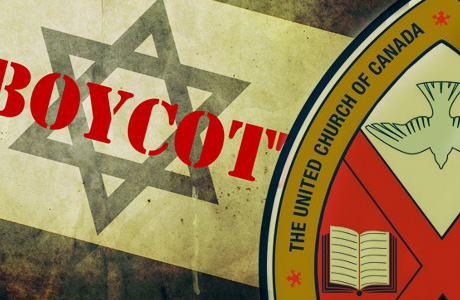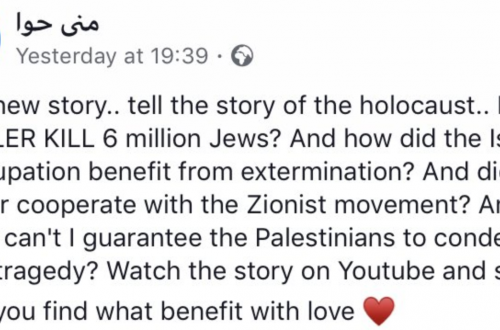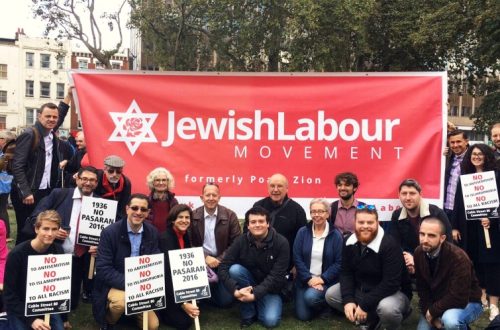This is a guest post by Brian Henry

The United Church of Canada has formally voted to align itself with the antisemites. In a historic vote on August 17, the church passed a motion calling for a boycott of goods produced by Jews in the West Bank and East Jerusalem.
This is a betrayal of the United Church’s claims to friendship with the Jewish people and a betrayal of its own membership, 78% of whom want the church to stay out of the issue or remain strictly neutral (see here).
The UCC is not boycotting Syria where the government is slaughtering its own citizens by the thousands, or North Korea where the government starves its own people, or any of the dozens of murderous tyrannies around the globe. Only Israel. Because, says the UCC, Israel is a democracy (more on this rationalization here) and because the church’s partners in the Middle East have called for a boycott.
But these partners are nothing but a rogues’ gallery of Israel-haters and antisemites.
First, there’s the Middle East Council of Churches. Like every one of the United Church’s Middle East partners, the MECC seeks the dissolution of Israel. The MECC insists on the so-called “right of return,” which means that Israel must open its borders to the five million descendants of Palestinians originally displaced by Arab wars against Israel.
In other words, the MECC’s prerequisite for peace is to replace Israel with a majority Palestinian state.
On closer inspection, the MECC looks even worse. The Syrian Orthodox Church is represented on the MECC’s executive council by George Saliba, the Archbishop of Mount Lebanon and an open Jew-hater.
According to Saliba (here), Jews incite unrest in the Arab world in accordance with The Protocols of the Elders of Zion – an infamous antisemitic tract much admired by Hitler that describes how Jews supposedly conspire to rule the world.
Next, there’s Greek Orthodox Archbishop Theodosios Atallah Hanna, one of the authors of the Palestine Kairos Document, which the UCC vigorously promotes in Canada (more here). In the Kairos Document, Hanna and the other authors talk about the need to end the occupation, but for Hanna all of Israel is occupied Palestine. Speaking at a Greek Orthodox Church in Jerusalem in 2003, Hanna said:
“Palestine is from the [Mediterranean] sea to the [Jordan] river. … We emphatically refuse any concession on [even] a grain of the land of our precious homeland…. The Zionist Jews…should go somewhere else in the world to establish their state and their false entity… They must leave their homes.”
Nor is Hanna shy about the use of violence. In the same sermon, Hanna said: “We do not believe in so-called ‘peace with Israel’ because peace cannot be made with Satan… The Palestinians’ rights will be restored only by resistance. What was taken by force will be restored only by force… We encourage our youth to participate in the resistance, to carry out martyrdom attacks.” (See here.)
Given Hanna’s enthusiasm for violence, it’s no surprise that in the Palestinian Kairos Document, which the United Church has so enthusiastically embraced, Hanna and the other authors defend terrorism as “legal resistance.” (Much more about Archbishop Hanna here.)
Pastor Naim Ateek of the Sabeel Liberation Theology Center in Jerusalem is another United Church partner and co-author of the Kairos Document. Statements issued from the Sabeel Center are more two-faced on the subject of violence.
On the one hand, Sabeel always calls for non-violent resistance, and on the other hand, praises the violence of others. So for example, Sabeel lauds the Palestinian rocket attacks against Israeli towns as “a blow to the arrogance and hubris of the Israeli government.”
Although these rockets are directed exclusively against civilian targets, Sabeel insists this is not terrorism, and though their rockets strike at homes, schools and hospitals, Sabeel says the Hamas killers “are seeking justice and freedom.”
And as in the Kairos document, Ateek insists that “international law gives them the right to resist and to defend themselves.” He doesn’t explain how shooting rockets at innocent civilians can possibly be described as “defence.”
Similarly, in an essay on suicide bombing, Ateek condemns the practice, but does so while heaping praise on the bombers.
According to Ateek, these “healthy, beautiful and intelligent young men and women” murder Jews in a “noble” cause because the world “has not heard their anguished cry for justice.”
Ateek doesn’t mention that Hamas has been responsible for most of the terrorism and that Hamas regularly explains that its purpose is to destroy Israel.
It has nothing to do with justice. On the contrary, Hamas’s founding charter looks forward to the day when the very trees of the land will call out, “There is a Jew hiding behind me. Come and kill him.”
Ateek is also notorious for reviving Christian antisemitism. He favours the image of Jews as Christ-killers, and his sermons feature lines such as: “In this season of Lent, it seems to many of us that Jesus is on the cross again with thousands of crucified Palestinians all around him.”
Are Jews really so evil? Do we crucify thousands of innocents? Do we nail up Jesus every year at Easter time? For two millennia such lies were used to justify persecuting Jews. Ateek is doing his best to bring that all back.
Such are the United Church of Canada’s partners in the Middle East. The United Church claims it rejects antisemitism, claims it seeks peace, claims and it doesn’t consider the Jewish people its enemy.
I doubt they’re fooling anyone but themselves.
This piece was previously published in the Jewish Tribune. Brian Henry is a writer and editor living in Toronto. He blogs sporadically here.


